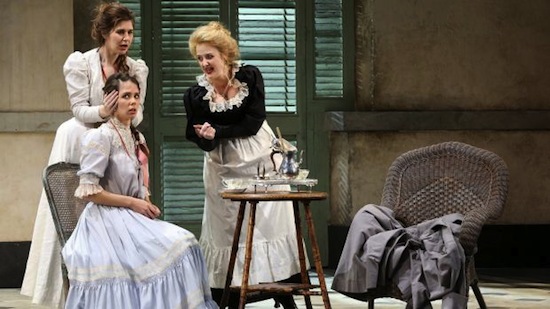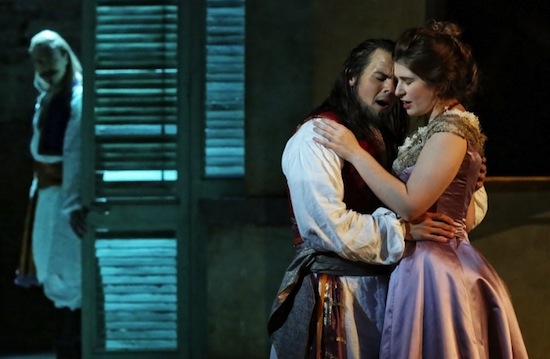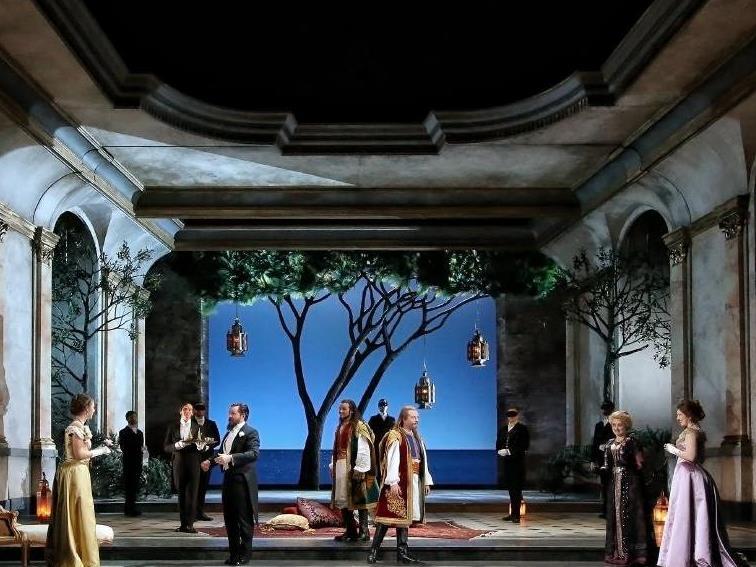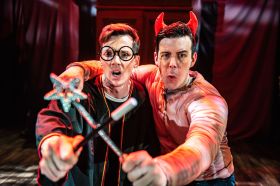Opera Australia’s production of Cosi fan tutte; Photo Prudence Upton, courtesy Opera Australia
What a tale of seduction, of deception – two sisters tricked by their fiancés into being unfaithful in a frivolous match of testosterone-driven egos.
We are talking about Opera Australia’s latest production of Mozart’s Cosi fan tutti, literally translated ‘all women are the same’. As British Director David McVicar points out in his production notes, it is ‘a troubling and ambiguous comedy’.
Three and a half hours later that folly of lovers has spiraled to its tragic conclusion, and audiences are left with a belly full of woe – hey, but what a production!
This revamped version of Cosi completes McVicar’s trifecta of Mozart operas for the Australian company, which started with Don Giovanni (2014) followed by The Marriage of Figaro (2015).
To add his touch, McVicar has opted to updated the traditional setting to the early 1900s, perhaps more in sync with the accelerating social mores explored in the opera.
Act I opens with gents milling in a club, its masculine billiard room transforms to become a stately coastal villa with views over a sparkling azure Mediterranean. Superbly visioned by German Designer Moritz Junge, the layered set creates both depth and grandeur and yet allows for intimate spaces and warmth, sensitively aided by David Finn’s lighting design.

Photo Prudence Upton, courtesy Opera Australia
This is an opera that flows beautifully despite its length. McVicar teases out the darkness of this tale, delivering all of opera’s stereotypical dramas while having no difficulty in massaging the comic moments, and bringing this opera closer to contemporary audiences.
Unlike Verdi’s big choruses that have the weight of a character in themselves – as demonstrated in Simon Boccanegra also in this winter season – Cosi fan tutti is delivered by six characters alone.
The lovers – Ferrando (David Portillo) and Guglielmo (Andrew Jones) smitten with the sisters Dorabella (Anna Dowsley) and Fiordiligi (Nicole Car) – deliver their roles with honed dramatic detail, energetic and witty, while remaining sensitivity to the pathos of love and loss.
Afterall, seduction requires vocal beauty, and it was delivered like honey bewitching the audience by these four singers – their various vocal ensembles spot on both in rapport and tone.
Carr and Dowsley were a stellar pairing. Car delivered the aria Come Scoglio (As the rock remains unmoved) with all the tumult of restrained temptation, the irony of her voice’s power is that she waivered into the arms of Ferrando in disguise (not her betrothed Guglilemo).
That passion is beautifully swayed into tones of regret with Dearest love, I beg your pardon in Act II; her character persuasively developed.
Mezzosoprano Dowsley’s voice in contrast conveyed the flighty and exaggerated passion of Dorabella with thrilling definition.
American Tenor David Portillo (Ferrando) and baritone Andrew Jones (Guglielmo) were an equally well-matched duo, their folly growing increasingly cold as the realization that the game played has no winner.
Mastermind of this plot is Don Alfonso, sung by Bass Richard Anderson, who captures the malice and bitterness of the loveless with sharp clarity, fueling the two love-sick lads into their imminent demise.
Partner in this crime, Despina – the sister’s maid – was sung by Soprano Taryn Fiebig with a ballsy, busty, burlesque quality, moving between animated characterisations and costume changes. She was totally dynamite and added the comic metre that balances this tragedy while delivering vocally.

Nicole Car (left) as Fiordiligi, Anna Dowsley as Dorabella and Taryn Fiebig as Despina in Opera Australia’s Cosi Fan Tutte. Photo: Prudence Upton
Everyone can see the approaching train wreck of this bitter-sweet tale except the six on stage – faked deaths, imposters, swapped lovers and compromised hearts.
Is it love, it is seduction, it is jealousy?

Photo Prudence Upton, courtesy Opera Australia
Listening to Lorenzo Da Ponte’s libretto, I couldn’t help but smile with the thought that it’s passion to repeat phrases had a parallel to the tactics of today’s political speechwriters – that catchy clause used to deliver a point … again and again.
It is not so dissimilar to Mozart-de Ponte’s message – a reality borne of rhetoric that must be lived.
Cosi was viewed as scandalous in Mozart’s day; today it read more like a “soap” of Kardashian banality, toying with emotions and taking what one wants. There is no happy ending here, only regret and mistrust – and in that it becomes a most contemporary tale.
Are indeed ‘all women the same’? Mozart offers little space for morning-after rectification; the closing tableaux of the opera with the “mis-paired” lovers weighty with the burden of their choices.
Rating 4.5 out of 5
Cosi fan tutte
Presented by Opera Australia, Sydney Opera House
Until 13 August
Composer: Wolfgang Amadeus Mozart
Liberetto: Lorenzo da Ponte
Conductor: Jonathan Darlington
Director: Sir David McVicar
Designer: Moritz Jung
Lighting Designer: David Finn





